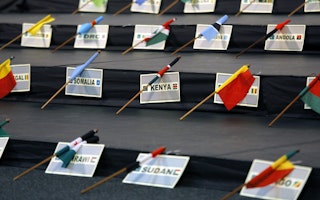How Illicit Financial Flows Drain African Economies
By Mohamed Sultan
African economies have lost between $597 billion and $1.4 trillion in illicit financial flows in the past three decades. That’s nearly equal to the entire continent’s current gross domestic product. This plunder results in missed development opportunities, increased poverty, and continued injustice.
While many African nations are experiencing unprecedented economic growth, illicit financial flows (IFFs) prevent this growth from translating into better overall living conditions for Africans.
What are “illicit financial flows”?
When money is moved secretly and illegally from one jurisdiction to another, this constitutes an illegal financial flow. For developing countries, the term refers to money that leaves the continent instead of being used to finance development.
Such funds may be proceeds from organized crime, smuggling, corruption, money laundering, tax evasion, or international trade manipulations.
While concentrated in a few countries such as Nigeria and Ghana, and essentially stemming from extractive and mining industries, IFFs are a burden for nearly all West African countries. Across the continent, only 3 percent of IFFs are derived from government corruption, while 33 percent comes from organized criminal activity and 64 percent from trade manipulations.
What’s driving these financial leakages?
The outflows are the result of many factors, such as poor (or poorly enforced) financial regulatory frameworks, weak and non-harmonized taxing regimes, international trade mispricing, opaque public procurement and contracting, and an increasingly organized and sophisticated web of multinational criminal networks whose modus operandi are only viable when their finances are untraced. Both the public and private sectors have a role to play in tackling IFFs.
Where is the money going?
By their very elusive nature, IFFs are difficult to track. Typically this money leaves Africa to end up in developed countries and in tax havens throughout the world. Recent numbers by the Center for Global Development indicate that developing countries lose between $8 to $100 billion a year in illicit flows to Switzerland.
How are Africans affected?
IFFs are a global problem. African citizens, however, are the most adversely affected. Every dollar that leaves the continent is a dollar lost to investment opportunities in critical sectors such as agriculture, food security, health and education services, and infrastructure.
The channels through which these funds flow are both a symptom and a cause of the endemic corruption in the region. Their presence undermines the foundations of developing economies, which impacts future equitable and sustainable development prospects for millions.
Why have illicit financial flows continued to rise in Africa despite the increase in “integrity institutions” such as anticorruption agencies?
There are many interrelated reasons why the rate of IFFs on the continent is not decreasing, including lack of oversight, the sheer complexity in tracking the money, and the limited resources by African institutions. Anticorruption agencies in Africa—government institutions designed to tackle corruption in the public and private spheres—face many challenges, from their independence and autonomy to their mandates, which sometimes do not give them the powers to prosecute or follow through on specific cases.
No single country can tackle IFFs, and wealthy countries must play their part. In fact, some of these same rich countries have a poor record of addressing corruption. According to the Center for Global Development, great steps forward can be made if rich countries "stopped protecting and enforcing repayment of odious debt, hindering recovery of stolen assets, allowing multinationals to make facilitation payments, and hiding oil and mineral royalty payments from public view."
How can illicit financial flows be curbed?
Several actions can be taken to counter IFFs, but all must involve collaboration—among regional and international bodies (such as the African Union and International Monetary Fund), government members (including whistleblowers, civil servants, and judicial actors), civil society, and the banking sector.
These measures could include:
- strengthening tax administration and enforcement through better regionally integrated systems;
- facilitating tax information exchange between governments from developed and developing countries;
- moving towards a consistent and globalized regulatory system on transfer pricing, including the use of advance transfer pricing systems;
- increasing global asset recovery capacity.
What are the Open Society Foundations doing to fight this resource drain?
The Open Society Initiative for West Africa is supporting a constructive policy dialogue among citizens’ groups, civil society organizations, and governments, for example in monitoring public procurement in Senegal and Nigeria. OSIWA is also working with international transparency and accountability mechanisms such as the Extractive Industries Transparency Initiative and Publish What You Pay to strengthen policy and regulatory reform processes in natural resources management.
On a regional level, OSIWA supports a regional integration process geared at tax harmonization and information-sharing among countries to help fight various forms of arbitrage and facilitate stolen asset recovery. Along with other Open Society foundations, OSIWA supports a global agenda for stricter regulations to uncover and prosecute shell companies, ensure the tractability of beneficial ownership, and broadly hold governments and corporations accountable to trade regulations.
Mohamed Sultan is economic governance program officer at the Open Society Initiative for West Africa.


